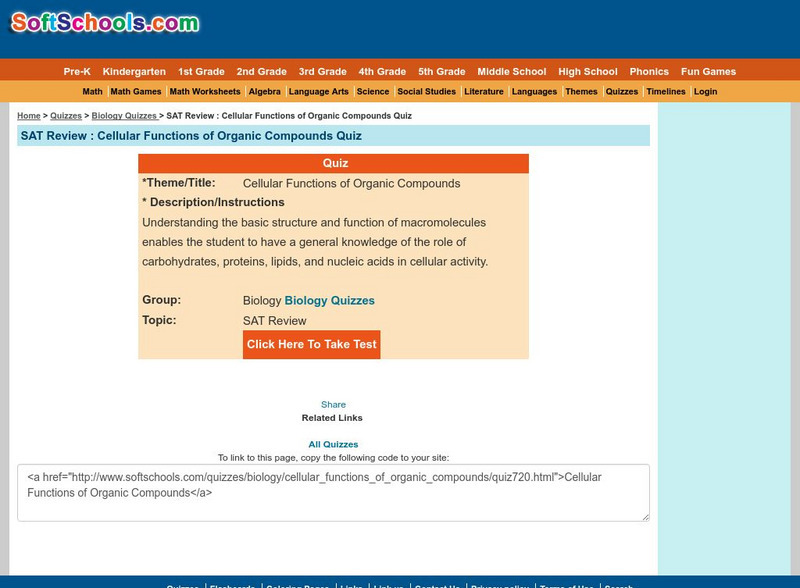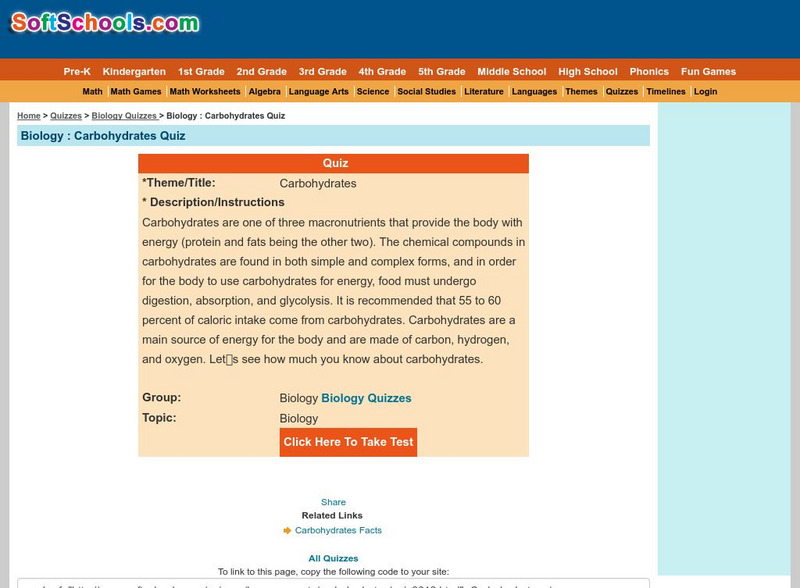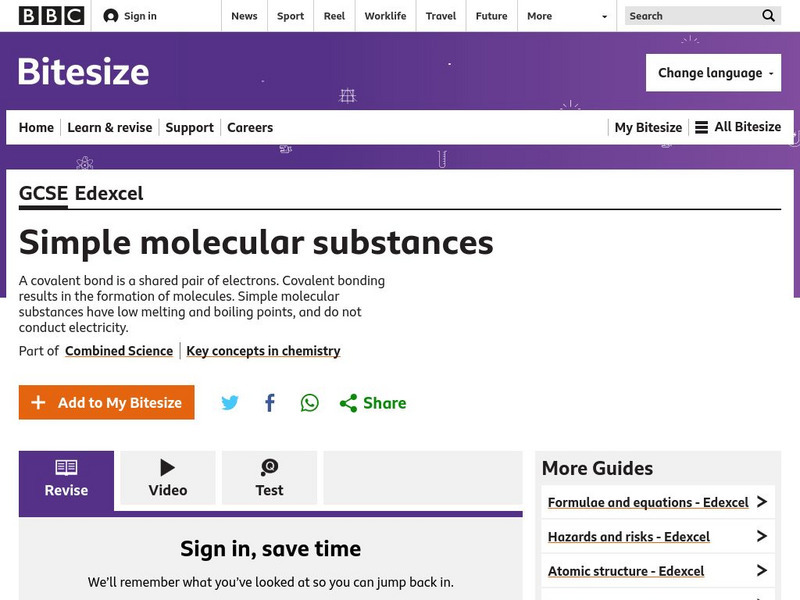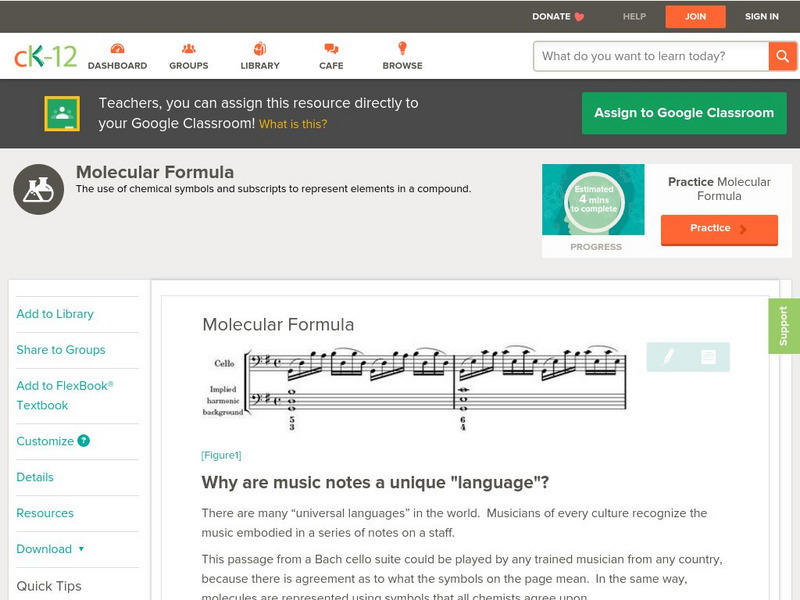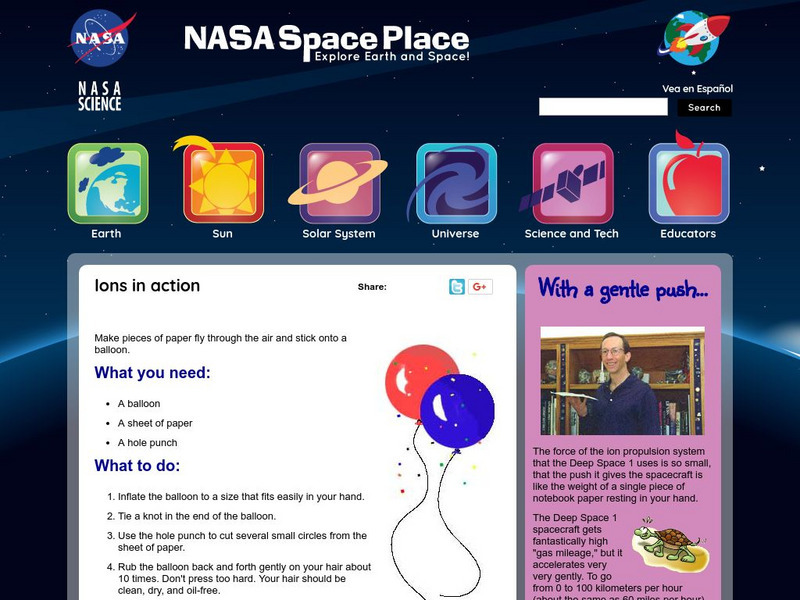Hi, what do you want to do?
Texas Instruments
Texas Instruments: Geometries and Polarities of Compounds
In this StudyCard activity, students are asked to describe the geometry and polarity of several molecules and ions. Geometries covered include linear, bent, trigonal planar, trigonal pyramidal, and tetrahedral. Students will need to have...
Soft Schools
Soft Schools: Cellular Functions of Organic Compounds Quiz
Take an interactive quiz over organic compounds. After completing the quiz, check your score, and then revisit any incorrect question for further review.
Upper Canada District School Board
Tom Stretton's Advanced Placement Chemistry: Atoms, Molecules and Ions
This online textbook chapter provides learners with advanced-level material on the structure and relationships between atoms, molecules and ions.
University of Alberta
The University of Alberta: Infrared Spectroscopy
Complete this interactive tutorial and learn about interpreting the infrared spectrum ("I" "R") that provides information about the functional groups in a molecule. Included are 12 labs and a quiz.
National Institutes of Health
Ncbi: The Molecular Biology of the Cell: The Chemical Components of a Cell
Advanced chapter of the book "The Molecular Biology of the Cell" describes and provides illustrations of our most current understanding of the chemical makeup of cells and their components. Explains in detail how electron activity keeps...
CK-12 Foundation
Ck 12: Chemistry Simulation: Air Matters
[Free Registration/Login Required] Explore the composition of air and learn about the different atoms and molecules that we breathe every day.
ClassFlow
Class Flow: Comparing and Contrasting Matter
[Free Registration/Login Required] This flipchart is a guided activity to help students compare different types of matter: atoms and molecules, elements and compounds, mixtures and solutions. It corresponds to Virginia science SOL 5.4.
Sophia Learning
Sophia: Characteristics of Matter
Find out the basic characteristics and main properties of all matter.
Soft Schools
Soft Schools: Carbohydrates Quiz
Take an interactive quiz over carbohydrates. After completing the quiz, check your score, and then revisit any incorrect question for further review
BBC
Bbc: Gcse Bitesize: Covalent Bonds
A covalent bond is formed between non metal atoms, which combine together by sharing electrons. Covalent compounds have no free electrons and no ions so they don't conduct electricity.
CK-12 Foundation
Ck 12: General Chemistry
[Free Registration/Login may be required to access all resource tools.] Students will be introduced to some of the basic concepts of chemistry.
CK-12 Foundation
Ck 12: Chemistry: Molecular Formula
[Free Registration/Login may be required to access all resource tools.] Defines molecular formula and describes how to write molecular formulas.
Other
Science Alive: The Many Faces of Steroids
This reading is an introduction to the great variety of steroids and their many different uses.
Sophia Learning
Sophia: Chemical Reactions: Lesson 4
This lesson will present a basic understanding of the periodic chart of elements and how to predict chemical reactions based on given information. It is 4 of 9 in the series titled "Chemical Reactions."
ClassFlow
Class Flow: What Is Matter?
[Free Registration/Login Required] Discover the composition of matter and the relationship between matter, atoms, and elements. Students will learn the differences between elements and compounds, and how molecules are formed. Chemical...
American Chemical Society
Middle School Chemistry: Represent Bonding With Lewis Dot Diagrams
Students draw and interpret Lewis dot diagrams for individual atoms and both covalent and ionic compounds.
Simon Fraser University
Chem1 Virtual Textbook: Naming Chemical Substances
As part of the "Basic Atomics" section of the Virtual Textbook, this site examines basic chemical nomenclature and covers a variety of subjects related to chemical substances. Other topic covered include naming the elements, binary...
Georgia Department of Education
Ga Virtual Learning: Ap Biology: Chemistry of Life
Through informational text, interactive activities, animations, and video clips, students examine the chemistry of living things, and they learn how interactions from atoms are fundamental to life as we know it.
PBS
Pbs Learning Media: Chemical Bonds
This interactive activity developed for Teachers' Domain demonstrates how attractive forces between atoms create chemical bonds, resulting in the formation of molecules and compounds.
University Corporation for Atmospheric Research
Ucar: Hydrocarbons
Learn about "hydrocarbons", chemical compounds whose molecules are made up entirely of carbon and hydrogen atoms.
Sophia Learning
Sophia: Chemical Reactions: Lesson 6
This lesson will present a basic understanding of the periodic chart of elements and how to predict chemical reactions based on given information. It is 6 of 9 in the series titled "Chemical Reactions."
Sophia Learning
Sophia: Chemical Reactions: Lesson 9
This lesson will present a basic understanding of the periodic chart of elements and how to predict chemical reactions based on given information. It is 9 of 9 in the series titled "Chemical Reactions."
NASA
Nasa: The Space Place: Ions in Action
The page from NASA's The Space Place describes a simple activity, charging a balloon and making it move small pieces of paper. It then goes on to give an excellent explanation of how the activity works, and how it involves ions. This...
Chiral Publishing
Chiral Publishing: An Introduction to Chemistry: Binary Covalent Nomenclature Help
Learn everything you ever wanted to know about naming binary covalent compounds! See how scientists came up with systematic names for many common molecules and study the prefixes and roots for them.






